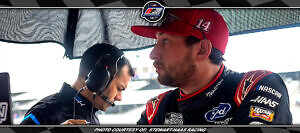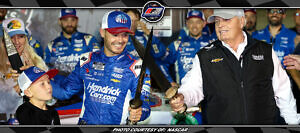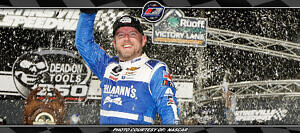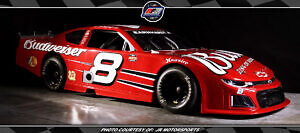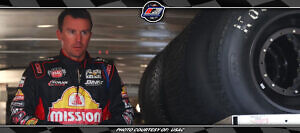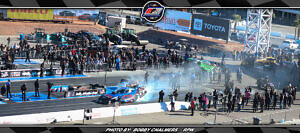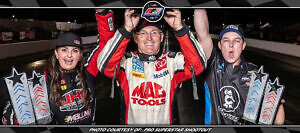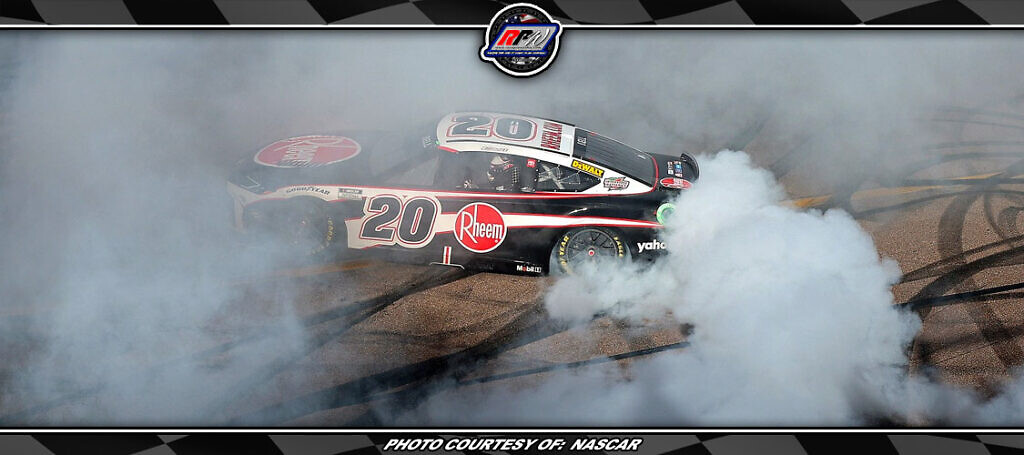
Column By: REID SPENCER / NASCAR – AVONDALE, AZ – If you were sitting in the sold-out grandstands at Phoenix Raceway on Sunday afternoon, you might be under the impression that Christopher Bell won the Shriners Children’s 500 in a runaway then and there.
There was ample evidence to support that observation. After all, Bell did take the checkered flag 5.465 seconds ahead of runner-up Chris Buescher, before indulging in a celebratory burnout.
And, yes, it was Bell who received the race winner’s trophy in Victory Lane, as his crew and team owner Joe Gibbs basked in the afterglow of a job well done.
In reality, though, the NASCAR Cup Series win was sealed for Bell specifically, and for the Toyota camp in general, before the Joe Gibbs Racing transporters ever steamed through the Turn 2 tunnel into the Phoenix Raceway infield.
The Toyotas unloaded with speed for Friday’s 50-minute practice session, with Bell at the forefront. No, the No. 20 didn’t post the fastest single lap—Bell was eighth on the speed chart in that respect—but crew chief Adam Stevens and the No. 20 team enjoyed an important luxury.
Because Bell’s Camry was close to optimum when it unloaded from the hauler, Stevens didn’t have to spend precious practice time taking big swings at a balky car. Bell ran the second-most laps in the session—63 to the 64 posted by fellow Toyota driver Bubba Wallace.
The 29-year-old driver from Norman, Oklahoma, was second fastest in 10-consecutive-lap average and fastest at 15, 20 and 25 consecutive laps. Bell and Ford driver Chase Briscoe were the only two competitors who completed 30-lap runs.
It didn’t take astute deductive skills to read the tea leaves on Friday. The Toyotas were destined to excel in Sunday’s race, and Bell was all but certain to be a contender for the victory, especially if long green-flag runs were the order of the day.
Bell fought a tight handling condition during Saturday’s time trials and qualified 13th. He struggled early in Sunday’s race before one significant adjustment to the balance of his Camry brought the car to life.
After the Stage 1 break, Bell restarted 10th on Lap 170 and began a systematic advance through the field. On Lap 181, four circuits before the end of Stage 2, he passed fellow Toyota driver Tyler Reddick for the lead.
A slow pit stop under caution on Lap 190 dropped Bell to 10th. And when his JGR teammate, Martin Truex Jr., stayed on track with eight other drivers for a Lap 221 restart after the final caution, Bell was 20th.
“I just drove through the field once,” Bell said after the race. “When I got put back, I didn’t think there was any way I could do it again. As the race progresses, it gets harder and harder to pass.
“Everyone is working on their cars, their balance is getting closer, so it becomes harder to pass later in the race. I didn’t think there was going to be any way I was going to make it up there twice.”
But Bell was relentless, and his car was cooperative. On Lap 261 of 312, he passed teammate Ty Gibbs for second, and when Truex pitted for fuel on tires on Lap 271, Bell had the lead and an unimpeded path to victory.
Dealing with a new body shape and the debut of NASCAR’s 2024 short-track competition package, Toyota nevertheless brought the fastest cars to the track. That’s a testament to hard work and the quality of the tools the Camry teams used to prepare the cars—simulations, wind tunnel and engine dynos.
JGR’s Denny Hamlin won the pole for the event, Gibbs qualified second, and five Toyota drivers combined to lead 298 of the 312 laps.
David Wilson, president of TRD (Toyota Racing Development) U.S.A. described Bell’s performance as a “momentous win.”
“It was unprecedented how much TRD USA and Joe Gibbs Racing worked together on that body,” Wilson said. “I may have said, because I say this all the time, you don’t race wind tunnels, you don’t race dynos.
“You could be the best on paper, but unless you have the talent behind the steering wheel and the team and the pit crews to put an entire race together, the rest is meaningless.”
Fortunately, Bell’s car was strong enough to overcome a pit road snafu and contrary strategy by some of his competitors. And Bell had the talent to drive the No. 20 Camry to victory, accounting for a goodly portion of the 2,813 green-flag passes in the race—the most in five Next Gen events at the track.
“Once we got the balance close, man, he just drove it straight to the front,” Stevens said. “He did such a good job of getting all the speed out of the car and giving us good feedback to make changes. The race played out pretty straightforward, and the best car won.”
But we already knew that on Friday, didn’t we?

